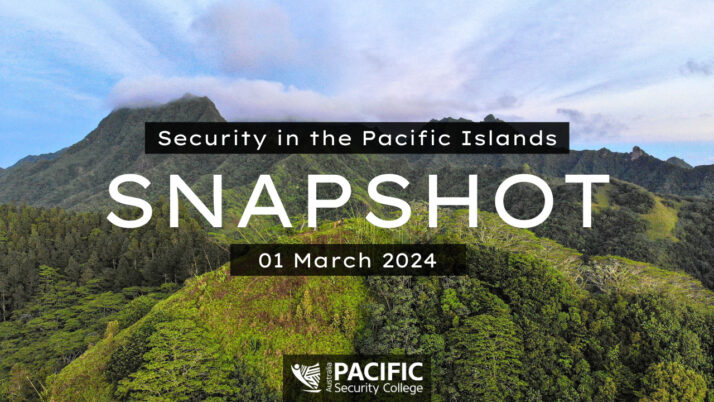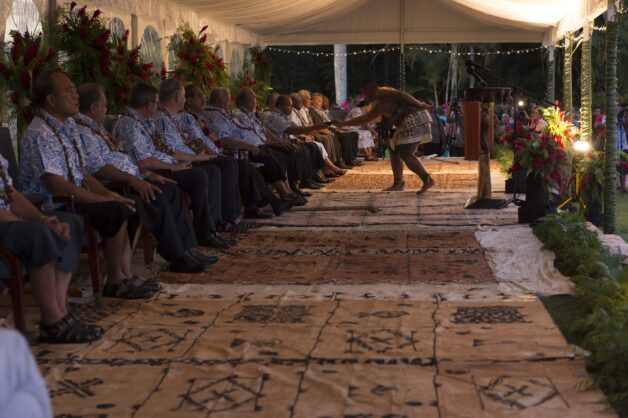Building Pacific solidarity
Henry Ivarature
Even in a pandemic, the Pacific remains subject to geopolitical bickering, but the region’s response must be driven by Pacific people, Henry Ivarature writes.
When the World Health Organization (WHO) declared COVID-19 a pandemic on 11 March 2020, it galvanised the Pacific Islands Forum (PIF) to begin consultations with member countries on a coordinated regional response.
By 26 March, six PIF countries had COVID-19 preparedness plans in place, including state of emergency declarations, in response to the pandemic. French Polynesia, New Caledonia, Fiji, and Papua New Guinea have reported cases of COVID-19, but the reality is with so little testing, it is impossible to know whether the spread is more pervasive.
Until just recently, PIF was quiet in terms of a coordinated response to the pandemic. As a result, it was criticised for not providing regional leadership. Observers suggested that the Boe Declaration – which outlines the need to address human security and humanitarian assistance in the region – should form the basis of a regional plan for the pandemic.
It seems governments agreed with this, and in a letter to Forum Leaders on 30 March 2020, Samoan Prime Minister Tuila’epa Sailele Malelegaoi called on the Forum to act.
“We find ourselves in extraordinary times and circumstances where the very mettle of our nations and governments are tested beyond any limits that we have known in our lifetime,” he said.
Finally, on 3 April 2020, PIF Secretary-General Dame Meg Taylor announced that a virtual meeting of foreign affairs ministers would be held on Tuesday 7 April. The impact of the pandemic on Pacific countries pushed the appeal for greater cooperation, with the Secretary-General saying, “if ever there was a time where the region and its partners needed to work together in strong solidarity to overcome a direct and immediate threat to the lives of our people across the Blue Pacific region – it is now”.
The meeting was informed by consultations with the WHO and the Pacific Community (SPC). On 8 April, the Chair of PIF, Tuvaluan Prime Minister Natano, reported that Forum leaders had invoked the Biketawa Declaration – a framework agreed to by all the leaders of Pacific Islands Forum countries for coordinating response to regional crises – to expedite a Pacific Humanitarian Pathway on COVID-19.
Since its endorsement by Forum leaders in 2000, the Biketawa Declaration has only ever been invoked twice: in 2003 in response to the ethnic tensions in the Solomon Islands, and in 2004 to help with economic recovery and rehabilitation in Nauru.
This happens so rarely because the declaration is only triggered by a regional crisis when other national avenues require greater support. In both previous cases, support from Australia and New Zealand was required to translate words into action and orchestrate the regional response. But in the past, each ‘crisis’ was geographically contained, and required targeted action. This crisis is very different — there is no pre-determined playbook to turn to.
This doesn’t mean policymakers can’t learn from past Pacific experiences with crises, however. Now, more than ever, getting the response right and achieving effective behavioural change will require cultural sensitivity, tailoring to place, and adaptation as we learn.
It goes without saying that what works in Tuvalu won’t necessarily work in Papua New Guinea, and learning from recent crises can help to shape the Pacific Humanitarian Pathway. By acting quickly, communicating effectively, and drawing on external relations to increase the response to the measles outbreak, Samoa, for instance, prevented many fatalities. Now, its experience is proving useful in dealing with COVID-19.
Similarly, Cyclone Harold left its destructive footprint, hitting Solomon Islands, Vanuatu, Fiji, and Tonga, and while islanders have learnt to pick themselves up from these annually recurring natural disasters and rebuild their lives, cyclone preparedness and recovery cannot be ignored.
Responding to a pandemic is not so different. Communication, pre-placement of supplies before the crisis hits, and using local networks to inform and coordinate supply distribution and recovery are crucially important.
Just like a cyclone, COVID-19 is affecting parts of the Pacific, while other areas remain untouched, for now. All countries will need to prepare for it to stop the reach of its tentacles further into the Pacific, both through domestic action and regional partnerships, but their experience with other crises will be useful in this.
Well-informed observers of the region know that Australia and New Zealand will carry the financial burden of this approach. Most Forum members do not have the ability to make large financial contributions to a fund or regional proposals.
Even the WHO’s contribution to a Pacific response for COVID-19, of $1 million, is jointly funded by Australia and New Zealand. Moreover, both countries are also assisting Pacific Island countries under their Pacific Step-Up and Pacific Reset agendas for the region.
Despite the weight of the burden, Australia’s Minister for the Pacific and International Development Alex Hawke acknowledged the scale of the challenge of COVID-19 and proposes to work ‘together as a Pacific family’.
This lack of resources has lent the COVID-19 crisis a geopolitical dimension, particularly with respect to Chinese assistance. This assistance may potentially create a fault line, or managed well, provide new possibilities for cooperation. Unfortunately, the former looks more likely. China has already set up China-Pacific Islands COVID-19 Response Fund of $1.8 million, and it lies outside of the regional approach discussed by PIF.
China has disbursed cash and medical supplies to a number of Pacific Island countries on a bilateral basis, and organised a video conference on 10 March on COVID-19 preparedness in the region for several Pacific Islands officials which subsequently led to the announcement of the Fund. Importantly, Australia and New Zealand were not involved.
Australia denies the existence of ‘geostrategic incentives’ in its assistance and that it is not competing with China to help Pacific countries address COVID-19. But, notably, it does not seem to be coordinating with China either.
According to Alex Hawke, “there is no competition on trying to save lives… we welcome any international effort from any country, from any multilateral agency, from any bank, or anyone that wants to do something for the Pacific. Australia plays a leading role in calling for it, and that includes China.”
Perhaps PIF, through the Pacific Humanitarian Pathway might take on this role to assert the regional leadership that seems to be missing and is expected to play.
It seems that Pacific people, even in the COVID-19 crisis, are still caught in the broader geopolitical narrative of other powers, but the region’s development narrative must not be driven by this.
The nations of the Pacific should not feel that they face a binary choice between China and traditional Pacific partners. The regional response to COVID-19 must be a development path for the wellbeing of Pacific peoples through genuine partnership with all actors.
Read more blogs by Henry Ivarature here.
More Stories

Security Snapshot - 28 Mar 2024
Pacific Security Snapshot | 28 March 2024
Summary ➣ Heavy rains, floods, landslides and earthquakes batter the region ➣ Pacific submissions to the International Court of Justice (ICJ) on climate change responsibility ➣ Elections across the Pacific prompting changes to diplomatic relations and security arrangements ➣ Challenges for women in politics Climate Security Lives have been lost in PNG after a series…

Security Snapshot - 1 Mar 2024
Pacific Security Snapshot | 01 March 2024
The security stories shaping the region ➣ Pacific Islands Leaders Meeting (PALM) to be held in Tokyo in July 2024 ➣ 2023 warmest year on record, globally ➣ Elections across the Pacific prompting changes to diplomatic relations and security arrangements ➣ Extractive industries booming ➣ Environmental conservation efforts ongoing ➣ PNG riots shed light on…







